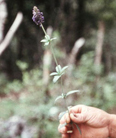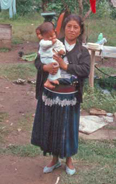Dr. David Casagrande
ethno-pharmacology

Associate Professor of Anthropology
Dept. of Sociology/
Anthropology
and
the Environmental Initiative
STEPS Building, Room 436
Lehigh University
1 West Packer Ave.
Bethlehem, PA 18015
Tel: (610) 758-2672
Ethnopharmacology is the cross-cultural study of how people derive medicines from plants, animals, fungi, or other naturally occurring resources. Up to now, the field has focused mostly on developing drugs based on the medicinal use of plants by indigenous people. The "discovery" that indigenous knowledge about medicinal plants may hold clues for curing "western" diseases has become one of the most widely used arguments for conserving cultural and biological diversity (see Farnsworth below). Due to the potential for profit, some drug companies have teamed up with botanists, anthropologists, biochemists, conservation organizations, and governments of less-developed countries to protect biologically diverse areas and search for new drugs. This has led to accusations of "bio-piracy," in which, it is argued, western interests loot indigenous knowledge for fame and/or profit. While this may in some cases be true, the flip side of medicinal plant research is that indigenous groups have become aware of the economic value of their intellectual and biological resources in the global marketplace. In some cases, this has renewed the interest of younger indigenous people in preserving their culture, and led to grass-roots, indigenous-based, entrepreneurial businesses targeting alternative medicine markets. While the motives of both western and indigenous participants may be questionable, it can be argued that ethnopharmacology is helping to maintain cultural and biological diversity.
 Salvia Lavanduloides is commonly use by the Tzeltal Maya to treat coughing (photo D. Casagrande)
Salvia Lavanduloides is commonly use by the Tzeltal Maya to treat coughing (photo D. Casagrande)
Medicinal plant research is urgently needed. The AIDS virus, the crisis of bacterial resistance to antibiotics, and other recent developments have increased the value of indigenous medicinal plant knowledge, which may hold clues for solving these deadly problems. Indigenous medicinal plant knowledge is also critical because synthetic chemical processes have proved inadequate for dealing with the rapid evolution of pathogens. Unfortunately, many opponents of medicinal plant research that involves indigenous people have chosen to ignore the fact that western medicine relies on plants and traditional knowledge for clues to cure our worst diseases.
In addition, plant species are disappearing, and many indigenous people have stopped transmitting traditional medicinal knowledge to their children. In many places, the current generation represents our last chance to find ways that indigenous people can benefit from their knowledge instead of simply liquidating their biological resources to join a global economy in which they are at a serious disadvantage, including not being able to afford western medicines. New and innovative programs of benefits sharing between indigenous people and biomedical scientists are intended to achieve this goal. Those who oppose medicinal plant research on principle, claiming that all such research is bio-piracy have failed to provide viable alternatives for conserving indigenous medicinal knowledge that is theatened by global capitalist forces.
But medicinal plant research includes much more than the discovery of new drugs. Recently, the field has been expanding to also include such diverse subjects as negotiation of power based on medicinal plant knowledge (see Garro below) and the co-evolution of humans and plants (see Alcorn and Johns below). The field also provides opportunities to study how human interaction with biological diversity is influenced by human psychology, cognition, and evolution.
My research can best be described as ethnopharmacognosy--the human cognitive aspects of medicinal plant use--in particular, how the human mind and human communication influence people's classification, conceptualization, and ultimately, their use of medicinal plants. Thus, my work crosses over from phytochemistry and the distribution of plants in the landscape to models of social consensus that represent distributed and externalized cognition. I consider information to be encoded in nature, interpreted by humans, and then "marked" for transmission within the context of discourse and social organization (see information ecology). I am particularly interested in those attributes of plants, social organization and cultural models that facilitate the transmission of knowledge.
 Herbal medicine market in La Paz, Bolivia (photo D. Casagrande)
Herbal medicine market in La Paz, Bolivia (photo D. Casagrande)Human use of medicinal plants provides an untapped resource for such basic research, because it represents an intimate interaction between people and plants that involves all of our senses, and because it results in measurable (quantifiable) patterns in the distribution of knowledge and behavior. My work has included experiments on taste classification of medicinal plants and quantifying consensus about medicinal plant use within the context of Tzeltal Maya social organization and discourse. (See also ethnoecology and information ecology)
Examples of my work in ethnopharmacology:
- Casagrande, D. G. 2005. Who wins? Globalization, migration, and indigenous commodification of medicinal plants in Chiapas. In G. Guest, Ed., Globalization, Health, and the Environment: An Integrated Perspective. Blue Rudge Summit, PA: AltaMira Press. (Abstract)
- Casagrande, D. G. 2002. Ecology, Cognition, and Cultural Transmission of Tzeltal Maya Medicinal Plant Knowledge. Ph.D. Dissertation, Dept. of Anthropology, University of Georgia. (Abstract) (Download PDF)
- Casagrande, D. G. 2001. Variability in Tzeltal Maya medicinal plant selection: A comparison between two communities. Paper presented at the Annual Meeting of the Society for Applied Anthropology. March 28-31. Merida, Mexico.
- Casagrande, D. G. 2000. Human Taste and Cognition in Tzeltal Maya Medicinal Plant Use. Journal of Ecological Anthropology. 4:57-69 (Abstract) (Download PDF)
- Casagrande, D. G. 2000. Cognitive aspects of Tzeltal Maya medicinal plant selection. Paper presented at the Annual Meeting of the American Anthropological Association. Nov. 15-19. San Francisco, CA.
- Casagrande, D. G. 1999. The role of Ethnobotany in drug discovery within the Maya International Collaborative Biodiversity Group. Paper presented at the Annual Meeting of the Association of University Technology Managers. March, 1999, San Diego, CA.
 |
|---|
Current Positions
Associate Professor of Anthropology, Lehigh University
Research Coordinator, Environmental Initiative, Lehigh University
Production Editor, Journal of Ecological Anthropology
Topic Editor, Encyclopedia of Earth
Associate Editor, Journal of Ethnobiology and Ethnomedicine
Degrees
Ph.D., University of Georgia, Ecological Anthropology
Master of Forest Science, Yale School of Forestry and Environmental Studies
B.S., Geography, Southern Connecticut State University
Languages
ENGLISH - primary, SPANISH - secondary, TZELTAL (Maya) - intermediate, GERMAN - basic
"Scientists believe in proof without certainty: most people believe in certainty without proof."
Ashley Montagu